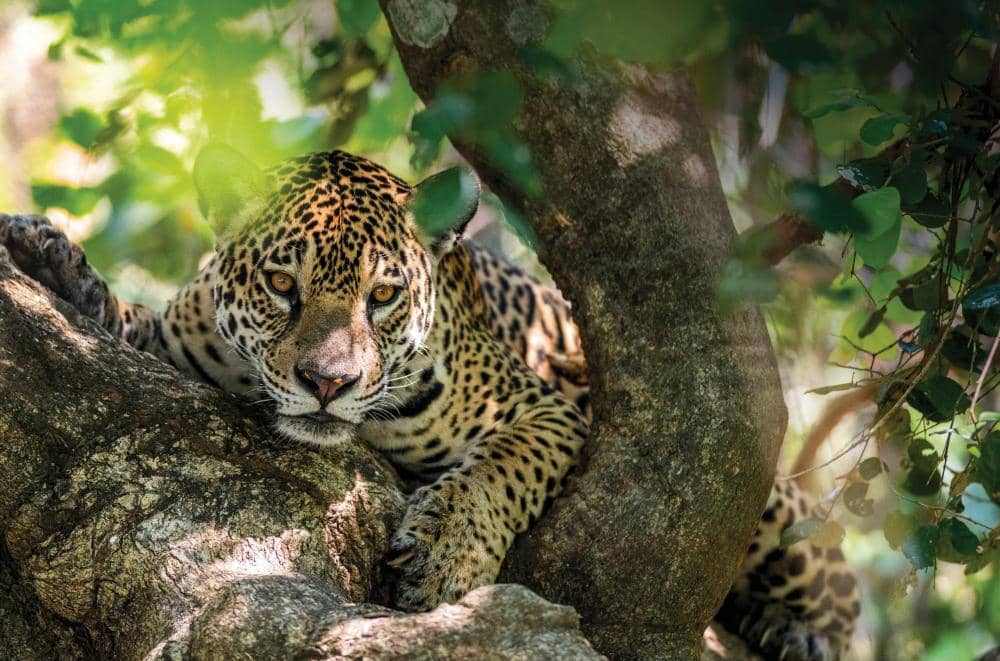AGAINST THE ODDS
BBC Wildlife
|Spring 2022
Brazil's Pantanal was consumed by wildfires in 2020. Miraculously, its jaguars not only survived, but are now thriving in the world's most famous wetland.

A DOZEN RIVERBOATS HUDDLE AGAINST the bank of a narrow tributary of the Rio Cuiabá in Brazil. The passengers on board jostle soundlessly to get the best view, while their camera lenses reach out like limbs across the water towards a patch of sand on the opposite bank
The mother emerges from the shrub first. She struts out onto the beach with an air of nonchalance. Her two cubs tumble out after her, splashing and play-fighting in the water to the delight of the tourists, who are all hungrily snapping photographs. It's our second jaguar sighting of the day. Given what happened here not too long ago, I can scarcely believe our luck. “Luck?” our guide Fisher Sousa says, raising an eyebrow. “We see jaguars every day.”

In 2020, the Pantanal, the planet's largest tropical wetland - an area larger than England, spanning Brazil, Paraguay and Bolivia - and the home of the highest concentration of jaguars on Earth, was engulfed in flames. Thirty per cent of the biome was scorched beyond recognition. International news reports showed apocalyptic images of wildfires surging through the forest, leaving the charred remains of coati and tapir in their wake. For people like Sousa, working in the Pantanal's developing ecotourism industry, there was a concern about what the fires would mean for the region's flagship species: the jaguar.
The Jaguar ID Project has built up a catalogue of 284 jaguars in the Pantanal's Porto Jofre river system, each one identified by its unique spot pattern. According to Abbie Martin, the project's director, the data on jaguars after the fires paints a promising picture. “After 2020, people seized on this narrative that the jaguars were dying,” she says. “But look at the numbers from 2019 and 2020, and compare them to 2021.”
This story is from the Spring 2022 edition of BBC Wildlife.
Subscribe to Magzter GOLD to access thousands of curated premium stories, and 10,000+ magazines and newspapers.
Already a subscriber? Sign In
MORE STORIES FROM BBC Wildlife

BBC Wildlife
"I was terrified the elephant would ram us"
African elephant in Kenya
2 mins
January 2026

BBC Wildlife
ALL YOU EVER NEEDED TO KNOW ABOUT THE Fennec fox
THE FENNEC FOX IS THE SMALLEST fox in the world, with a body length that can be as little as 24cm.
3 mins
January 2026

BBC Wildlife
INTO THE PLASTISPHERE
A unique synthetic ecosystem is evolving in our oceans – welcome to the plastisphere
7 mins
January 2026

BBC Wildlife
“More than half of all animal life exists in a parasitic relationship, and all life lives in symbiosis”
Our survival depends on species evolving to live together - but some relationships take dark turns
7 mins
January 2026

BBC Wildlife
Are animals able to dream?
SLEEP IS A MYSTERIOUS THING. FOR A long time, we weren't sure why we do it.
1 mins
January 2026

BBC Wildlife
Does a cuckoo know it's a cuckoo?
ABSURD LITTLE BIRDS ACROSS THE world lay their eggs in the nests of other species, leaving the hapless parents to raise a changeling at the expense of their own offspring.
2 mins
January 2026

BBC Wildlife
Orcas killing young sharks
Juvenile great whites are easy prey for orca pod
1 mins
January 2026

BBC Wildlife
Ocean goes on tour
Acclaimed film touring the UK, backed by live orchestra and choir
1 min
January 2026

BBC Wildlife
Feisty bats hunt like lions
Winged mammals use a 'hang and wait' strategy to take down large prey
1 mins
January 2026

BBC Wildlife
SNAP-CHAT
Richard Birchett on magical merlins, wily coyotes and charging deer
2 mins
January 2026
Translate
Change font size

